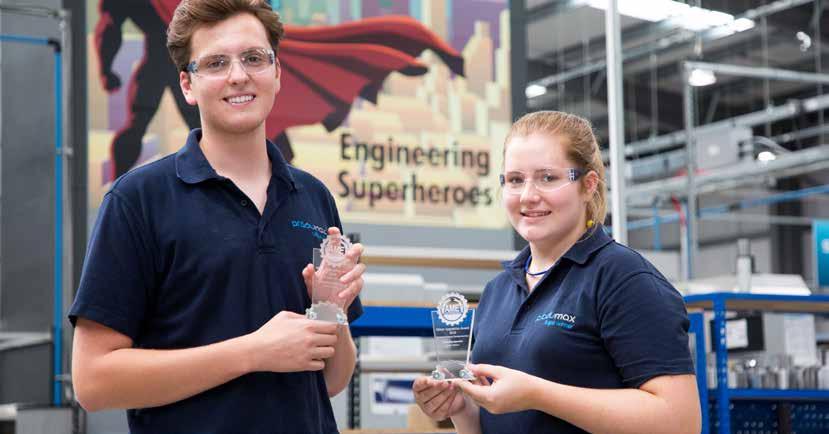
5 minute read
FROM GRANT TO SCALED-UP MANUFACTURING: ROADMAPPING FOR SUCCESS
From stakeholder engagement to project planning, managing the complexities of a technologyfocused research project can be daunting. Over the past few years, roadmapping has been used at the University of Cambridge as an approach to support several projects focused on innovative technologies for cancer treatment and diagnostics.
Here, we feature one of these technologies highlighting how an approach such as roadmapping can support decision-making and help to get research projects off to the best possible start.
Advertisement
The survival rate for most cancers has doubled over the last 40 years, with 50% of patients surviving 10 or more years. However, for hard-totreat cancers such as pancreatic and glioblastoma (brain cancer), the survival rates remain below 14%.
The Interdisciplinary Research Collaboration (IRC) in Targeted Delivery for Hard-to-Treat Cancers programme comprises clinicians, chemists and engineers from across five leading universities (including Cambridge) working together in the development of new technologies to better combat some of these challenging diseases.
To help progress the development of one of their leading technologies – an injectable hydrogel that can be used in the treatment of glioblastoma tumours – IRC used the Institute for Manufacturing’s roadmapping approach to create a pathway forward towards a clinical trial of the technology.
Searching for innovative cancer treatments
IRC researchers are currently looking at more innovative ways to deliver existing cancer drugs. Oren Scherman (Professor of Supramolecular and Polymer Chemistry at the University of Cambridge and IRC member) explains how IRC is developing an injectable hydrogel technology that can be loaded with drugs for direct application following removal of the bulk of a glioblastoma tumour:
“We are working on technology that can safely and effectively deliver drugs to residual brain tumour cells. It’s important because the average survival time following a glioblastoma tumour diagnosis is 12–15 months. The lack of new treatment options for brain tumours is devastating for patients, and there is an urgent clinical need for a new therapeutic approach. Increased survival of rodents treated with the drug-delivering gel has already been demonstrated, and we are now hoping to progress to human trials.”
With IRC keen to begin clinical trials of the hydrogel, it was recognised that there needed to be a means of identifying and addressing all preclinical requirements and challenges. This is where roadmapping came in.
Technology roadmapping
IfM Engage, the knowledge-transfer arm of the Institute for Manufacturing, blends consultancy, training and mentoring to help organisations with their strategic and technology innovation planning through roadmapping. Guided by IfM Engage Solution Development Specialists Dr Diana Khripko and Dr Imoh Ilevbare, IRC was joined by key stakeholders for a series of workshops during May 2021 to develop a technology roadmap outlining a pathway to first-in-human trials and beyond.
Stakeholders included researchers, clinicians (who will deploy the technology), potential manufacturers, consultants (who have experience in applications to the Medicines and Healthcare products Regulatory Agency for regulatory approvals) and other academics who had already been through the regulatory process for approval for a completely new technology.
Over the course of three workshops, the stakeholders reflected on the technology development progress to date; mapped and explored key challenges; and identified the pathway forward towards the clinical trial of the technology.
“The IRC had new technology which they had initially tested in the lab, and they were looking at how to upscale this new technology for therapeutic application,” says Dr Diana Khripko.
“One key stage is to do clinical trials in humans – which is a massive milestone. Once you have trialled in humans, then you can set up a manufacturing site to produce the technology at scale.
“So, what IfM Engage helped IRC to do via roadmapping was to design their strategy from the lab to in-human trials but also to get them thinking about large-scale manufacturing,” she explains. “The goal was to understand what the key challenges were in terms of application for regulatory approval for an in-human trial, and also the challenges from a manufacturing point of view. What are the critical questions that need to be asked, and how are they inter-related?
“For example – the question of how to ensure that the treatment is sterile. Everything that is deployed for clinical use needs to be sterilised, but there are different ways to do this. The decision you make about this has implications for what kind of testing you need to do in the lab before you go to clinical trial and also how the large-scale manufacturing processes need to be set up.”
Amanda Fuller, Programme Manager of IRC, explains how the sessions provided a framework to focus on specific priority areas:
“Priority areas included sterilisation, the investigation of critical quality attributes, the selection of manufacturing partner(s), the selection of drugs for initial clinical trials, and the identification of possible funding sources for scale-up/toxicology trial.
“The resulting outputs of the workshop sessions was a decision tree and the roadmap, which helped to identify the decisions that needed to be made at different stages along a timeline, matched with the different type of activities that needed to be completed along the way (for example, stakeholder engagement, documentation, research activities) and what the correlation was between the activities.
“The roadmapping process provided a structured way to ‘pick the brains’ of a number of experts not directly involved with the project. It shines a light on the breadth of challenges to be overcome in order to commercialise a technology,” says Diana.
Stepping onto the roadmap
The collaborative approach of the strategic roadmapping helps to bring multiple stakeholders together and draw a pathway in a very time-efficient manner, says IfM’s Professor Ronan Daly:
“Through doing the roadmap, we can accelerate the process by learning from clinical, industrial and academic colleagues. We were able to benefit from their experience developing medical devices or treatments; and researchers who have worked on this type of development and also experts who understand the regulatory approval process who can help us understand the right kind of data and knowledge needed,” he says.
The roadmap is used by the project team to steer progress, update existing information and capture any further relevant data; but what did this mean practically for the IRC team and development of the hydrogel?
“The roadmap has led to the appointment of a dedicated project manager to implement the roadmap to first-in-human trials,” Amanda Fuller says. “It has resulted in identifying a method for delivering a sterile product; the selection of manufacturing partners; and the application for further funding for a key preclinical efficacy study.
“Ultimately, roadmapping has helped us identify the critical questions that need to be answered in order to move a novel technology from the research laboratory to clinical trials. It has also helped to create a clear working order/ prioritisation for questions that must be answered and tasks required with a focused timescale,” she says.
Professor Daly describes how the roadmapping has meant the project has felt less daunting:
“At the start of projects like these, it can be overwhelming to consider the number of stakeholders you need to consult and questions you need to answer. Developing this roadmap has helped us considerably – it has given us the time to explore important questions, some of which we may not have considered this early in the process, like how the production technologies change when scaling up from research to large-scale manufacturing, and the impact they will have on the products.
“It has also enabled us to build a clear view of where we are heading, which I think means we are stronger as a team that is spread out geographically. Ultimately, it has helped us to start the project on a strong footing, and it is great to see the progress we are already making in progressing this potentially significant treatment.”
A variety of research activities across the UK are focused on the development of innovative medical solutions for the diagnostics and treatment of cancers, such as non-invasive or targeted approaches. So far, IfM Engage has supported five such research projects in developing programme-level roadmaps that could be used to track the progress of the projects and to support decisionmaking.
Elizabeth Tofaris: ejar2@cam.ac.uk









